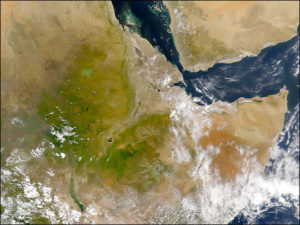
Ethiopian scientists and engineers are building a small Earth observation satellite in cooperation with and with funding from China, which will be launched from China in 2019, according to a report in The East African newspaper. This announcement is the culmination of much effort to bring Ethiopian space ambitions to reality.
“The satellite will be launched from China while the control and command station will be in Ethiopia,” said Dr. Solomon Belay Tessema, the director general of the Ethiopian Space Science and Technology Institute at the Addis Ababa University, in the report in The East African.
Dr. Tessema also explained that most of the preliminary and critical design of the satellite is being performed by Ethiopian scientists. Its design, development and manufacturing cost U.S.$8 million. China has provided training for the project as well as U.S.$6 million in funding.
“Our main goals for launching this first satellite are two. The first is to build technology application capacity and the skills of our engineers through collaborations with different countries’ space scientists and institutions,” Dr, Tessema told The East African, noting that the technology and knowledge transfer will enable the Ethiopian scientists to “design, build and launch the second satellite independently.”
The second main goal, Tessema continued, is to save the country from spending money buying data and information it could collect for its development agenda.
Twenty Ethiopian aerospace engineers are involved in the satellite project. Furthermore, about 60 masters and Ph.D. students are also taking part in research and training at the space institute, as well as at the country’s multibillion-dollar Entoto Observatory and Research Centre.
Ethiopia is collaborating with universities and observatory centres from around the world, including the United States, United Kingdom, France, Italy, Spain, Russia, South Korea, Chile and South Africa.
Dr. Tessema also told The East African that the satellite will be used to gather data on water, agriculture, climate change, and the environment. In 2017, the African Union passed an African space policy calling for the adoption of a framework to use satellite communication for economic progress and the development of a continental outer-space programme.
With this project, Ethiopia joins seven other African countries which have built and launched satellites: South Africa, Egypt, Nigeria, Ghana, Algeria, Morocco, and Kenya. Angola also launched its first satellite in December 2017, but lost it four months later. Russia, which built the lost communication satellite, is building another one for Angola, set to be launched in 2020.





